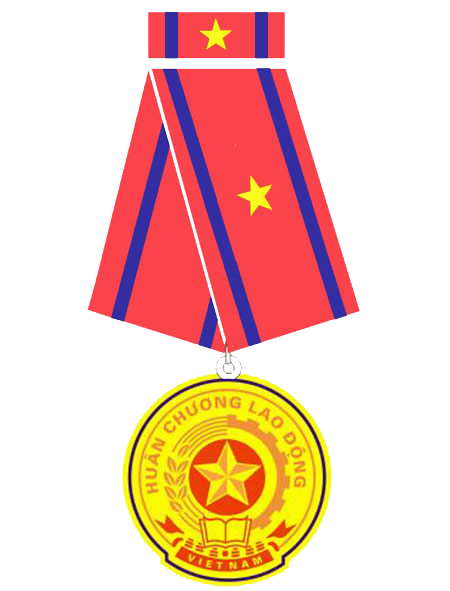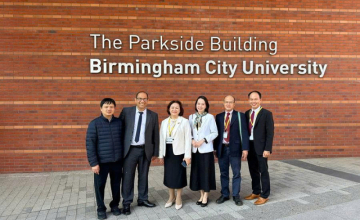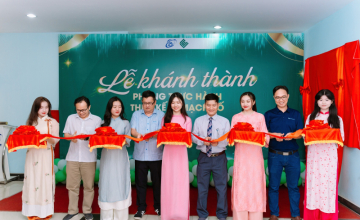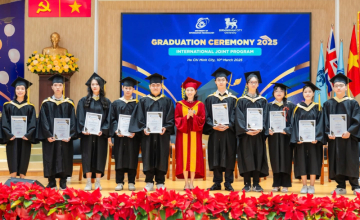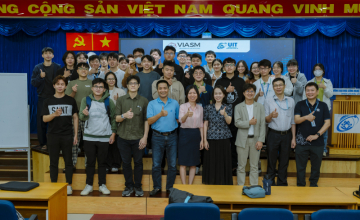Pham Vi (born in 2001) is currently a teaching assistant in the 3D GIS course at the University of Information Technology, Ho Chi Minh City (UIT). He is a prominent representative of Generation Z in the field of scientific exploration and research. At just 22 years old, he has several successful AI/ML projects to his name, with one notable project being the improvement of mobile device image recognition and quality testing for transport vehicles.

Continuous Effort to Achieve Success
What motivated you to pursue scientific research?
Under the roof of the university, I studied the 3D geographic information system under the guidance of Dr. Nguyen Gia Tuan Anh and MSc. Luu Thanh Son. Their dedication and unwavering support ignited my passion for research. This passion drove me to develop my thesis and later my scientific research projects.
What achievements are you most proud of in your journey to becoming a young scientist?
In my pursuit of becoming a scientist, I have achieved several significant milestones. One of the accomplishments I'm most proud of is my scientific research project involving the application of GIS technology for land component classification and soil erosion calculation in Vietnam using the RUSLE model (Soil Classification and Soil Erosion Calculation Modeled Using RUSLE Model, GIS). This research was presented at the 2023 Young Scientists and Researchers Conference at the University of Information Technology (Ho Chi Minh City National University). This work aims to address issues related to soil erosion caused by climate change and intrinsic factors.

What challenges have you faced on this journey?
From my perspective, GIS (Geographic Information System) is a field that can be quite selective about who can pursue it. To complete this research, I had to overcome many difficulties and challenges. I spent a lot of time and effort collecting data, preprocessing data, and analyzing geographic data and images to build models, conduct experiments, and write reports. Furthermore, to ensure the scientific rigor of my work, I had to acquire extensive knowledge about GIS technology, geology, and climate change.
What helped you overcome these challenges in your pursuit of becoming a young scientist?
To overcome these challenges, I relied on three primary factors: passion, determination, and support from those around me. The biggest motivation for me during tough times was my passion for science. I've always enjoyed exploring and discovering new things. This passion helped me overcome difficulties and stay committed to pursuing my dreams. Next, it's the determination and persistence on the journey to achieve my dream. I always believed I could become a skilled young scientist, and that self-confidence kept me going when facing difficulties. Finally, the tremendous support from my teachers and friends, who provided encouragement and assistance throughout my studies and research, was a great source of strength. Their help enabled me to overcome obstacles and achieve specific goals.

The Field of Interest and Future Plans
Currently, you're managing a group of friends who are passionate about scientific research. Can you share your team's plans?
I'm fortunate to have met many like-minded young people this semester. Currently, I'm working on four research projects in this field, two of which are in-depth research and the other two focus on practical applications. All these projects have a common goal: to contribute to science by addressing issues such as air pollution, land degradation, and climate change. More specifically, these projects will focus on the coverage of surfaces, the smoothness of geographic data, flooding, and soil erosion, which have been shared issues over many decades. I hope that these projects will achieve significant success in the future.

Any advice you would like to give to young people aspiring to become young scientists?
I'd like to emphasize that you should follow your own passion. The most crucial aspect is to have a genuine love for scientific work. If you don't enjoy the work, it will be challenging to overcome the difficulties and challenges in pursuing your dreams. Perseverance and continuous effort are essential on this journey! Scientific research demands a lot of time, effort, and perseverance. You will face many difficulties and challenges, but never give up. Lastly, keep learning. The world of science is always changing and evolving. You need to continuously learn and stay updated on the latest knowledge and trends in your field to avoid falling behind.
From my experience in university, I realized the importance of participating in research activities, training courses, and conferences to meet and connect with scientists and experts in your field. Your network of relationships will offer you many opportunities to learn and grow. This was something I lacked during my years at university, which resulted in me entering this field later than my peers.
Further information: https://tuyensinh.uit.edu.vn/gen-z-hanh-trinh-chinh-phuc-khoa-hoc-o-tuoi-22
Written by: Ha Bang
Translated by: Ngoc Diem

